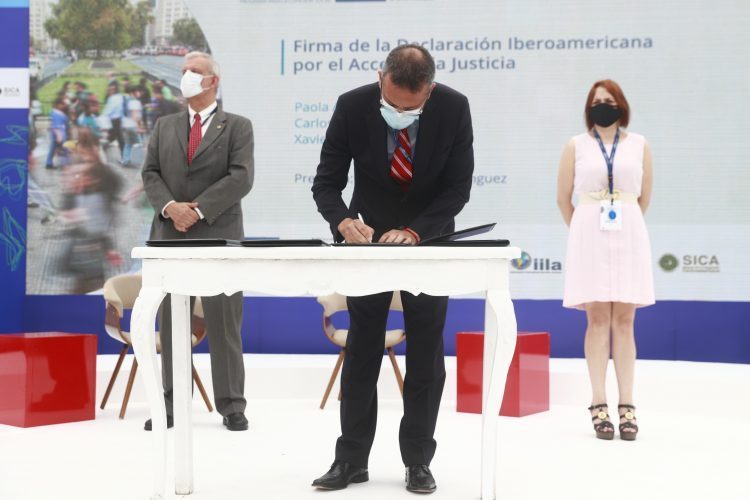The Declaration "Access to justice as an essential element to face inequalities regarding the impact of COVID-19" was signed in Valparaíso by representatives of the Conference of Ministers of Justice of the Ibero-American Countries (COMJIB), the Ibero-American Association of Public Prosecutor's Offices (AIAMP) and the Inter-American Association of Public Defenders (AIDEF). This declaration concluded three days of intense debate and exchange on the new political and social pacts necessary in Latin America, in an event with more than 100 representatives of institutions and experts in governance convened by the European Union cooperation EUROsociAL+ programme.

Foto: Firma de la Declaración
Without justice there are no rights. The joint declaration signed in Valparaíso by the region’s main justice institution networks is based on this apparently simple premise. The signatory networks, representing 23 countries in the region, recognised that COVID has exacerbated poverty and inequalities in effective access to justice systems directly impacted by the pandemic, in a context where, due to an increase in issues, demand for justice is increasing and where changes have generated new needs. Therefore, the development of an Ibero-American Regional Strategy for Access to Justice is urgently needed to facilitate the linking of National Plans for Access to Justice in countries and the promotion of the application of the Brasilia Rules on Access to Justice. The signatory networks demand that access to justice must continue to be a priority line for international cooperation in order to guarantee inclusive societies and the enforceability of economic, social, cultural and environmental rights.
More than ever, women and girls need effective and safe access to justice
“Especially pressing is the case of women and girls, since the pandemic has intensified violence against them both inside and outside the home, multiplying the obstacles they have to overcome to reach the justice services or enable the application of protection measures. This situation makes specific measures for them more necessary than ever within the formal justice system, but also through other alternative conflict resolution or restorative justice mechanisms,” said Paola Andrea Jhon Martínez, Deputy Secretary General of the Conference of Ministers of Justice of the Ibero-American Countries (COMJIB).
Need to guarantee effective mechanisms of access to justice for people in situations of mobility
Carlos Mora Jano, National Defender of Chile and Secretary General of the Inter-American Association of Public Defenders (AIDEF) highlighted the special needs of migrants and refugees: “In recent years, the need for effective mechanisms of access to justice for populations in situations of mobility has increased exponentially at a time of mass migration in the region unprecedented in the last century.”
Digitisation: an opportunity but also another gap
Although the pandemic has accelerated the use of technology, fostering telematic relationships between people and the justice system, in spoken acts (telematic trials) and in writing (submitting briefs and carrying out procedures electronically or digitally) or teleworking, “the use of technological media, despite its many advantages, also has a negative impact on access to justice for some sectors of the population: digital disparities constitute an additional gap that must be addressed urgently”, stated Xavier Armendáriz Salamero, Deputy National Prosecutor of the Chilean National Prosecutor’s Office and chairman of the Ibero-American Association of Public Prosecutors (AIAMP).
Last Wednesday, at the opening ceremony, Stella Maris Martínez, General Defender of the Nation of Argentina and General Coordinator of AIDEF, celebrated the signing of this Declaration: “It is an honour for AIDEF to sign this significant document for the region, together with other Networks that also play a great role in guaranteeing effective access to justice for all people.”
For her part, Anna Terrón, director of the FIIAPP, the Spanish cooperation entity specialising in promoting public systems through the exchange of knowledge between institutions, recalled during the EUROsociAL+ event that equitable access to justice for all people “is one of the pillars of Sustainable Development Goal No. 16 and is a key right which makes other social and economic rights effective, so it must be at the heart of new pacts in the region.”
Three days to outline new pacts in Latin America
The signing of this declaration meant the conclusion of three days of intense work in which more than 100 people responsible for public policies and institutions from Latin America and Europe gathered in Valparaíso (Chile) at the annual meeting of EUROsociAL+, the European Union programme cooperating with Latin America. Transparency and access to information, redistributive taxation and the fight against corruption, the need to territorialise public policies and access to justice are the four axes on which this meeting was organised, which sought to set the political framework for an inclusive recovery, strengthening democracy in the region.



